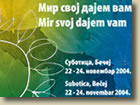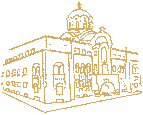|
Information
Service of
the Serbian Orthodox Church
November 24, 2004

MESSAGE
FROM THE CONFERENCE ON THE CONTRIBUTION OF THE CHURCHES TO RELIGIOUS,
CULTURAL AND INTER-NATIONAL COOPERATION ON THE PATH TO EUROPEAN
INTEGRATION
 The
Serbian Orthodox Church’s Diocese of Backa and the Roman Catholic
Bishopric of Subotica, with the support of the Reform Christian
Church, the Slovak Evangelical Church and the Evangelical Christian
Church, organized a Conference on the Contribution of the Churches
to Religious, Cultural and Inter-National Cooperation on the Path
to European Integration from November 22-24, 2004 in Subotica
and Becej. Participants in the Conference included the clergy
and theologians of the aforementioned Churches, representatives
of the state government, local administration and national councils,
officials of the United Nations and European institutions in our
country, as well as truly impartial and responsible intellectuals. The
Serbian Orthodox Church’s Diocese of Backa and the Roman Catholic
Bishopric of Subotica, with the support of the Reform Christian
Church, the Slovak Evangelical Church and the Evangelical Christian
Church, organized a Conference on the Contribution of the Churches
to Religious, Cultural and Inter-National Cooperation on the Path
to European Integration from November 22-24, 2004 in Subotica
and Becej. Participants in the Conference included the clergy
and theologians of the aforementioned Churches, representatives
of the state government, local administration and national councils,
officials of the United Nations and European institutions in our
country, as well as truly impartial and responsible intellectuals.
All participants
in the Conference agreed on the following:
1. The Christian
Churches gathered at this Conference call for fruitful dialogue
and fraternal cooperation, such as they themselves traditionally
nurture, among all persons and institutions that have the need
and the possibility of making a contribution to the furthering
of religious, cultural and inter-national cooperation among people
individuals and peoples. At the same time, participants of the
Conference encourage all servants in the Church, as well as all
faithful, to encourage mutual dialogue and concrete cooperation
within their communities in keeping with their Christian mission.
2. Keeping
in mind the fact that the process of integration of European peoples
is primarily unfolding in accordance with economic and political
principles, we wish to remind of the historical and spiritual
truth that Christianity is the source and the original inspiration
of the spiritual unity of Europe. Consequently, the Christian
Churches of the East and the West are witnesses and bearers of
the fundamental values of Europe. Without authentic life in the
spirit of Christian values, it is impossible to establish consensus
and unity among the different peoples, traditions and customs
of Europe.
The identity
of Europe in essence is comprised of the triptych of Jerusalem,
Athens and Rome, i.e. Christian faith, the Greek cultural model
and the Roman sense of law and justice. We share the conviction
that Europe is not limited to the countries of the European Union,
or of Western and Central Europe, but that Europe is a great open
continent and spiritual concept.
3. In the
community and interweaving of confessions, nations and cultures
in Serbia, first and foremost, in Vojvodina, we recognize united
Europe in miniature and our own responsibility in the process
of European integration.
4. We wish
to emphasize that those who believe that their nationality, faith
and culture can develop fully in isolation are not correct nor
those who believe that in order to join the family of democratic
peoples of Europe it is necessary to renounce one’s own heritage
and identity.
5. Cognizant
that the Churches base their life and their mission on love toward
God and their neighbor, we call on all Christians and people of
goodwill to examine their own conscience and to [demonstrate]
responsible and proactive love toward their neighbor that transcends
customary tolerance. Christians do not live merely next to each
other or with one another, they live for each other because every
person, regardless of faith, skin color or social status, recognizes
the living icon of God and in it loves his or her brother or sister
[created] in God’s image. From this standpoint we jointly condemn
every form of violence and extremism such as anti-Semitism, Islamophobia
and similar.
6. We remain
faithful to the values of which modern Europe remains proud and
counts among its accomplishments such as individual dignity, peace
and social justice.
7. Aware of
the precious centuries-old experiences of the Church, which have
also come to be expressed at this Conference, we are prepared
to offer society our support and assistance in resolving concrete
problems, such as human and minority rights issues, bioethics,
economic and social stratification, threats to the environment
and others.
8. Evangelical
principles and the expectations of the faithful people of God
give us the right to expect and ask for the possibility of more
open and effective inclusion of Christians in the course and resolution
of the problems of the society in which we live. We believe that
we as Christians have the right and the responsibility, like all
other citizens, to use the mechanisms of public action to contribute
to the general good. At the same time, we emphasize the necessity
of enabling the Churches to provide testimony about themselves
and their mission in the modern world through the public media.
Given in Becej,
On November 24, 2004
On
behalf of the participants of the Conference:
Bishop
Irinej
of Backa (signature) |
Archbishop
Stanislav Hocevar
of Belgrade (signature) |

JESUS
CHRIST IN THE DARKNESS OF HISTORICAL CRITICISM
The editorial
office of Pravoslavlje, the official publication of the Serbian
Patriarchate, and the Udruzenje Srpski Sabor Dveri are organizing
a public forum on the theme of “Jesus Christ in the darkness of
historical criticism” following the publication of Predrag Samardzic’s
new book. The lecture will be held at the Faculty of Machine Engineering
on Thursday, November 25, 2004 at 6:00 p.m.
Speakers
at the public forum will include His Grace Bishop Irinej of Backa
and His Grace Bishop Atanasije of Zahumlje and Herzegovina (retired).

[Serbian
Translation Services]

Copyright © 1999-2004 by
The Information Service of
the Serbian Orthodox Church
11000 Belgrade
Kralja Petra I no.5
+381 11 3282 596
e-mail
|

